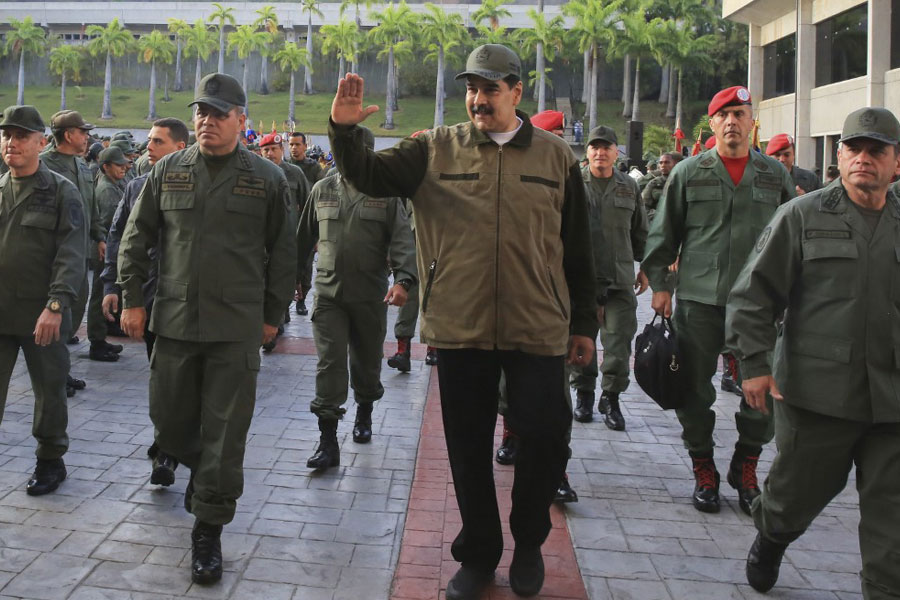Continúa el debate sobre si la solución de la crisis de Venezuela pasa por una intervención militar. Algunos consideran que no sería el mejor camino y otros opinan que es la única alternativa.

AFP/Jhonn Zerpa
En un hilo publicado en Twitter, el politólogo estadounidense John Polga-Hecimovich señala que sacar a Nicolás Maduro del poder es fácil, tomando en cuenta que el poder militar de Estados Unidos es superior al de la Fuerza Armada venezolana.
El problema radica en qué vendría después.
“Imagínense a Venezuela tras una invasión militar exitosa, con una Fuerza Armada debilitada y una presencia fuerte del ELN y de grupos paramilitares y colectivos. La única opción para evitar la anarquía es una presencia militar de largo plazo, tal y como ocurrió en Irak o Libia”, explica el experto sobre por qué, luego de la operación, en Venezuela tendrían que quedarse por varios años las tropas norteamericanas.
Por otra parte, indicó que Venezuela no es ni Panamá ni Granada, donde las intervenciones sucedieron en plazos cortos.
De este modo, cita al politólogo Ben Denison, quien señala que las intervenciones extranjeras fracasan cuando el poder extranjero se ve obligado a reconstruir las instituciones locales.
«Los gobiernos extranjeros creen que las intervenciones son sencillas, así que por ello no planifican con detalle; la probabilidad de éxito aumenta con la capacidad de acción del Estado y la fortaleza de las instituciones. Y en el caso de Venezuela, ambas variables están en muy malas condiciones», explica Denison.
It is tempting to believe that US military intervention would quickly and efficiently solve #Venezuela's woes, or at least preferable to the current status quo.
— John Polga-Hecimovich (@jpolga) May 12, 2019
The US military, after all, is the most sophisticated and technologically advanced in the world, and the Venezuelan military is made up of hungry soldiers and a militia that trains like this: https://t.co/J03SubCvUn
— John Polga-Hecimovich (@jpolga) May 12, 2019
So why do experts almost universally agree that a US military intervention of Venezuela would be a disaster?
In part, because intervention is more costly in reality than on paper and in part because rebuilding after a foreign intervention is difficult.
— John Polga-Hecimovich (@jpolga) May 12, 2019
According to @FrankMora_FIU, there are two plausible ways the United States might use military force in Venezuela: 1. a precision bombing campaign or 2. a full-scale invasion.https://t.co/lwRzaxTI2C
— John Polga-Hecimovich (@jpolga) May 12, 2019
Either option would probably be successful at removing Nicolás Maduro from power.
This is not the problem. The problem is what comes *after*.
— John Polga-Hecimovich (@jpolga) May 12, 2019
Mora says, "Even if a military intervention began well, U.S. forces would likely find themselves bogged down in the messy work of keeping the peace and rebuilding institutions for years to come."
But why would the US be needed for rebuilding? Couldn't Venezuela do this itself?
— John Polga-Hecimovich (@jpolga) May 12, 2019
Probably not. Rebuilding countries need strong militaries to guarantee order and stability in the state building process, but invading forces necessarily destroy those militaries.
@QuicoToro pointed this out back in February: https://t.co/jYOzceZBrS
— John Polga-Hecimovich (@jpolga) May 12, 2019
Imagine Venezuela after a successful US intervention, with a weakened or destroyed FANB and an even stronger presence of the ELN, armed criminal groups/megagangs, and colectivos (among others). The only options are anarchy or a long-term US presence–or both, like Iraq or Libya.
— John Polga-Hecimovich (@jpolga) May 12, 2019
But what about Panama (1989) and Grenada (1983)? Those were operationally successful, right?
Panama and Grenada are nothing like Venezuela in terms of their geography, state security apparatuses, or importantly, institutions.
— John Polga-Hecimovich (@jpolga) May 12, 2019
Moreover, in terms of state capacity, Venezuela today is just as similar, if not more, to Saddam's Iraq or Gaddafi's Libya (I'll come back to this).
— John Polga-Hecimovich (@jpolga) May 12, 2019
@DenisonBe wrote about this back in January, summarizing his dissertation research on foreign invasions and applying it to Venezuela:https://t.co/tkzzr1EmGY
— John Polga-Hecimovich (@jpolga) May 12, 2019
Using historical data, he shows that:
1. Trying to change a foreign regime generally fails, especially when the outside power is attempting to build new domestic institutions.
2. Policymakers think interventions are easy, which leads to poor planning.
and…— John Polga-Hecimovich (@jpolga) May 12, 2019
3. Local institutional strength is crucial in determining the success of foreign intervention and nation-building.
So, state capacity and institutional strength are key to reconstruction efforts. This bodes poorly for Venezuela.
— John Polga-Hecimovich (@jpolga) May 12, 2019
Depending on the specific indicator, the country probably possesses the weakest state capacity and institutional strength of any country in the Americas.
First, here is Venezuela's government effectiveness in comparative context; it is the lowest in Latin America. pic.twitter.com/x3L1WaQvwA
— John Polga-Hecimovich (@jpolga) May 12, 2019
That is not all. Here I graph "state authority over territory" against "rule of law index". Countries in the upper right score well, well those in the lower left (Yemen, Syria, South Sudan) score poorly. Venezuela ranks really low.
How low? pic.twitter.com/52ZuUOtOOu
— John Polga-Hecimovich (@jpolga) May 12, 2019
The second chart overlays Libya, Afghanistan, Syria, Panama, and Iraq before their most recent foreign interventions. Venezuela fares poorer on rule of law and state authority over territory than ANY of these other places. pic.twitter.com/iKvZlsAADg
— John Polga-Hecimovich (@jpolga) May 12, 2019
Numbers reflect the state's lack of monopoly on the use of force, due to ceding control of prisons to pranes, selected urban areas to criminal groups, and rural areas, like the Arco Minero, to gangs.
Venezuela isn't Iraq or Libya–it may be WORSE.
— John Polga-Hecimovich (@jpolga) May 12, 2019
Removing leaders in those places was relatively easy, but post-intervention occupations and rebuilding have not been.
As I wrote back in January, Venezuela's weak institutions and low stateness would require a sustained institution-building project to achieve stability.
— John Polga-Hecimovich (@jpolga) May 12, 2019
Redacción Maduradas
También puede leer:
